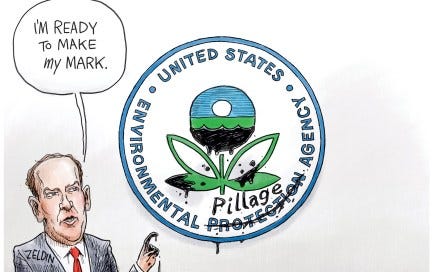“…man is a part of nature, and his war against nature is inevitably a war against himself.” ~Rachel Carson
Rachel Carson’s book, Silent Spring, was released in 1962. The book documented the environmental harm caused by the indiscriminate use of DDT. Carson accused the chemical industry of spreading disinformation, and public officials of accepting the industry's marketing claims unquestioningly.
As you might expect, the book was met with fierce opposition by chemical companies but it was a gamechanger, none-the-less. It was the spark for an environmental movement that took off in the 1960s.
During her tenure as First Lady, Lady Bird Johnson served as a champion of conservation efforts, advocated for the creation of National Park Service units, lobbied for the passage of environmental legislation, and campaigned for the improvement of the character of the nation’s highway system. In 1965, the Johnson Administration took action to enhance the beauty of America’s roadways through the Highway Beautification Act (HBA), which sought to limit billboards, junkyards, and other visual clutter that impacted the appearance of interstate highways.
“Though the word beautification makes the concept sound merely cosmetic, it involves much more: clean water, clean air, clean roadsides, safe waste disposal and preservation of valued old landmarks as well as great parks and wilderness areas. To me…beautification means our total concern for the physical and human quality we pass on to our children and the future.” ~Lady Bird Johnson
The environmental movement became even more widespread in 1970, when Wisconsin Senator Gaylord Nelson organized the first Earth Day, a nationwide "teach-in" and protest, to bring environmental issues to the forefront of public and political discourse.
This momentum led to the creation of the Environmental Protection Agency (EPA) in 1970 and the passage of landmark legislation like the Clean Air Act, Clean Water Act, and the Endangered Species Act. These were excellent pieces of legislation coming out of the Nixon years.
I was in college at the time, and by 1973 my little college was offering Environment classes for the first time. I don’t remember it being a class run by the Biology department — I could be wrong — but I took the class and vaguely remember a history/political science type professor teaching it.
In any case, it really politicized me to the point that I worked with a classmate to get recycling done on our campus ~ my very first political endeavor. We were unrelenting and the maintenance folks finally gave in and worked with us. When I went back for the 10th reunion, I smiled, when I saw the hand painted garbage cans, that we had labeled “for recycling only” still being used on the campus.
Before the EPA, the air, water, and land in the US were heavily polluted, with cities shrouded in smog, rivers and lakes unsafe for swimming or drinking, and widespread industrial pollution impacting ecosystems and human health. The Cuyahoga River in Cleveland, Ohio, famously caught fire multiple times due to the high levels of industrial pollution.
Once called “too thick to drink, too thin to plow,” the French Broad River had its array of pollution problems over the decades. Strife with industrial, agricultural, and urban runoff, the French Broad was a cesspool of pollutants prior to the Clean Water Act in 1972. (Source: State of our French Broad River)
Factories and power plants emitted large quantities of pollutants into the air, contributing to smog and acid rain. I can remember as child, when my family would be driving up north to Michigan, as we drove along the southern shoreline the stench from the Gary, Indiana steel mills was disgusting. As we held our noses, my brother and I had our little routine of saying over and over again, “Gary, Indiana smells like a rotten banana.”
The EPA regulations have helped tremendously. Our rivers are cleaner and our air is less polluted. The EPA has protected endangered species, and regulated hazardous waste, leading to significant improvements in environmental quality.
The environmental movement has continued to evolve, encompassing issues like climate change, environmental justice, and sustainability, with various groups and organizations playing a role in raising awareness and advocating for change.
About a decade ago, I heard an amazing lecture at the Garden Club of America National Affairs & Legislation Meeting (NAL) in Washington DC and became a bit obsessed with the whole issue of climate change and what we need to do to address it.
According to their website (as of the last time, I looked):
The mission of EPA is to protect human health and the environment.
EPA works to ensure that:
Americans have clean air, land and water;
National efforts to reduce environmental risks are based on the best available scientific information;
Federal laws protecting human health and the environment are administered and enforced fairly, effectively and as Congress intended;
Environmental stewardship is integral to U.S. policies concerning natural resources, human health, economic growth, energy, transportation, agriculture, industry, and international trade, and these factors are similarly considered in establishing environmental policy;
All parts of society--communities, individuals, businesses, and state, local and tribal governments--have access to accurate information sufficient to effectively participate in managing human health and environmental risks;
Contaminated lands and toxic sites are cleaned up by potentially responsible parties and revitalized; and
Chemicals in the marketplace are reviewed for safety.
There are those who feel that the EPA sometimes overregulates and makes “progress” difficult. On some level, I’m OK with overregulation. I happen to be one person who is pro-environmental protection. I’ve been driving a hybrid car for over a decade; I recycle; I even haul my food scraps to the Asheville Food Waste Reduction program. I have friends, who are even more environmentally vigilant and have put solar panels on their home!
So needless to say, I am utterly appalled by the pronouncement of Trump’s new EPA Chairman, Lee Zeldin, when he said, “the new mission of the agency is to “lower the cost of buying a car, heating a home and running a business.”
“Today is the greatest day of deregulation our nation has seen. We are driving a dagger straight into the heart of the climate change religion to drive down cost of living for American families, unleash American energy, bring auto jobs back to the U.S. and more.”
I read about this guy on Wikipedia. From what I can tell, his only qualification for the getting the job was his support of #FOTUS during Trump’s first impeachment trial — no environmental committees, knowledge or education, that I could find in his resume.
#FOTUS's stance on environmental issues is clear. His pollution agenda includes:
Prioritizing Fossil Fuels: he consistently advocates for increased domestic production of oil, gas, and coal, even in areas previously protected, and has opposed policies aimed at transitioning to renewable energy sources.
Rolling Back Regulations: rolling back numerous environmental regulations, including those related to emissions from power plants, clean water protections, and energy efficiency standards, arguing that they hinder economic growth.
Questioning Climate Change Science: He has expressed skepticism about the severity and human cause of climate change, and his actions, such as withdrawing from the Paris Agreement, reflect this skepticism.
Appointing Industry-Friendly Officials: Has appointed individuals to key environmental agencies who had close ties to the fossil fuel industry.
Trump's slogan "Drill, baby, drill" epitomizes his focus on expanding fossil fuel extraction and production, which has been viewed as a direct contradiction to environmental protection efforts.
Donald Trump has raised more money from the oil and gas industry … with a surge of fossil fuel funding coming in the six months since he directly requested $1bn from oil executives and then promised he would scrap environmental rules if elected. Source: The Guardian, Trump gets record donations from big oil
I recently taught a class at UNCA-OLLI about the history of Route 66. I spent one class session on the role of the highway during the 1930s. What I remembered learning in school about the Great Depression was the stock market crash, the loss of personal savings, and the high levels of unemployment primarily in cities. There was some discussion about the farms, but it didn’t really register with me, until I taught this class.
After WWI, the US became instrumental in feeding Europe with significant exports of wheat products. Throughout the 1920s farmers were experiencing price declines on their crops, with the exception of wheat. So during that decade farmers planted 300% more wheat than in previous decades. As a result, many farmers moved to the Great Plains and began digging up the grasslands. Digging up grasslands, whether for agriculture, development, or other purposes, leads to habitat destruction, biodiversity loss, soil degradation, and increased carbon emissions, impacting wildlife, ecosystems, and climate.
This set the stage for the one of the greatest environmental disasters in history: The Dust Bowl, a period of severe drought and dust storms from 1930 to 1936.
I feel like we are headed for another great environmental disaster and doing it with our eyes wide open and our government as an accomplice.
As the EPA Launches Biggest Deregulatory Action in U.S. History, I find myself feeling heartsick.
Thought for the day in honor of his birthday…
“It is right that the influence of the Government should be known in every humble home as the guardian of frugal comfort and content, and a defense against unjust exactions, and the unearned tribute persistently coveted by the selfish and designing. It is right that efficiency and honesty in public service should not be sacrificed to partisan greed; and it is right that the suffrage of our people should be pure and free.”
~ Grover Cleveland
Must Read Article:
The Environmental Protection Agency (EPA) seems to have undergone an overnight rebrand, one that looks as if it were written and directed by the oil and gas industry. The core mission of the EPA, since its inception during the Nixon administration, has been to protect human health and the environment. No longer. Lee Zeldin, the EPA administrator, who, by the way, is a lawyer and former congressman — his only qualification for running the agency is fealty to Trump — said that the new mission of the agency is to “lower the cost of buying a car, heating a home and running a business.”
This anti-environmental agenda comes at a time when global temperatures continue their steep rise and weather events become more frequent, more costly, and more deadly. Last year was the hottest year on record, after 2023. Twenty-seven weather disasters — hurricanes, floods, wildfires — costing more than $1 billion each hit the U.S. last year. In 1980 there were only three. You’d have to live in a cave to believe our climate isn’t changing, and quickly.
Zeldin announced a barrage of regulation rollbacks, promising to drive “a dagger through the heart of climate-change religion.”
Quote of the day:
“Proponents of destroying environmental protections may not be concerned about dirty air, filthy water and contaminated soil, but these will affect them. Do they desire a return to what our environment was like before the Environmental Protection Agency was established, and consequential protections like the Endangered Species Act were signed into law decades ago by a Republican president, Richard Nixon?
Our health and our economy are stronger with safeguards that help all of us breathe, eat and drink better, providing confidence that daily living will not harm us.
Some members of the G.O.P. used to call themselves the Party of Life, but with their attempts to destroy institutions that have helped keep us healthy and safe, that moniker now seems absurd. Perhaps they will change their philosophy after they experience the damage their policies have on their own families and communities, and on themselves. I hope it is not too late by then.”
~ Edwin Andrews
What I’m reading today…
A breakdown of major EPA deregulatory moves around water, air, climate
Environmental Protection Agency Administrator Lee Zeldin announced nearly three dozen deregulatory moves that he said would spur the U.S. economy by rolling back rules that have unfairly burdened industry. Many of the moves would affect landmark regulations aimed at protecting clean air and water.
The Felling of the U.S. Forest Service
Four months after Hurricane Helene, this meant deciding which bridges urgently needed to be rebuilt, which road repairs prioritized, and which trails in the Pisgah National Forest cleared first so that small towns dependent on visiting hikers and campers could get back to business. The most immediate need, Bunty and her colleagues knew, was manpower. They already had about forty unfilled positions and estimated that they needed another hundred to get the job done. …fourteen people who were involved in hurricane recovery had received word that they had been fired in the Trump Administration’s nationwide purge, including Mike Knoerr, the wildlife biologist responsible for the entire Pisgah National Forest, which sprawls more than five hundred thousand acres. His work was essential to insuring that recovery work would comply with federal law.
“Our most dedicated public servants were fired right when we need them most. Much of my work in the coming years would have been focused on making our floodplains more resilient, addressing fuel risks, and working to keep rare species on the landscape…It’s heartbreaking. I love these mountains.”
Trump Is Freezing Money for Clean Energy. Red States Have the Most to Lose.
In a quest to eliminate any funding linked to climate change, the Trump administration has frozen federal grants for everything from battery factories to electric school buses and issued executive orders that have halted federal approvals for wind and solar projects. Mr. Trump and Republicans in Congress are also working to repeal the 2022 Inflation Reduction Act, which is projected to pour hundreds of billions of dollars over the next decade into low-carbon energy technologies through tax credits, loans and grants.
“This is where we get a test of whether the Republican Party is a real political party serving its constituents, or a personality cult. I expect thousands of people to be laid off, I expect workers to be furloughed, and I expect construction projects to halt."
What Zeldin didn’t say is that the economic and health benefits from decades of federal clean air regulations have far outweighed their costs. Some estimates suggest every $1 spent meeting clean air rules has returned $10 in health and economic benefits. In the early 1970s, thick smog blanketed American cities and acid rain stripped forests bare from the Northeast to the Midwest. Air pollution wasn’t just a nuisance – it was a public health emergency. But in the decades since, the United States has engineered one of the most successful environmental turnarounds in history.
Pete Hegseth’s Climate Change ‘Crap’
Climate change is driving instability across the globe. When crops fail or water runs dry, populations move, and crises follow. Climate-driven migration is already destabilizing regions across Central America, the Middle East, Africa, and South Asia. Commanders at Southern Command and Africa Command have repeatedly testified that environmental degradation is a primary driver of insecurity. The 2024 Annual Threat Assessment by the Office of the Director of National Intelligence found that “the accelerating effects of climate change are placing more of the world’s population, particularly in low- and middle-income countries, at greater risk from extreme weather, food and water insecurity, and humanitarian disasters, fueling migration flows and increasing the risks of future pandemics as pathogens exploit the changing environment.” The secretary of defense normally listens to combatant commanders for input into the National Defense Strategy, but Hegseth seems to be precluding one of the major threats.
The US military has cared about climate change since the dawn of the Cold War – for good reason
For decades, military leaders have been discussing climate change as a threat and a threat multiplier that could worsen instability and mass migration in already fragile regions of the world…As the impacts of climate change grow in both frequency and magnitude, the costs of inaction are increasing. Most economists agree that it’s cheaper to act now than deal with the consequences. Yet, in the past 20 years, the political discourse around addressing the cause and effects of climate change has become increasingly politicized and partisan, stymieing effective action.
E.P.A. Targets Dozens of Environmental Rules as It Reframes Its Purpose
Mr. Zeldin said the E.P.A. would unwind more than two dozen protections against air and water pollution. It would overturn limits on soot from smokestacks that have been linked to respiratory problems in humans and premature deaths as well as restrictions on emissions of mercury, a neurotoxin. It would get rid of the “good neighbor rule” that requires states to address their own pollution when it’s carried by winds into neighboring states. And it would eliminate enforcement efforts that prioritize the protection of poor and minority communities.
Mother Nature doesn’t care who you voted for. If there’s a tornado headed your direction, you need access to early warning systems. Gutting NOAA means you won’t have that.
Assessing the Global Climate in February 2025
The February global surface temperature was 2.27°F (1.26°C) above the 20th-century average of 53.8°F (12.1°C), making it the third-warmest February on record. According to NCEI’s Global Annual Temperature Outlook, there is a 4% chance that 2025 will rank as the warmest year on record.
EPA terminates Biden-era climate grants worth $20 billion
“Without a shred of evidence, Administrator Zeldin is escalating his unfounded attempts to unilaterally terminate congressionally authorized and contractually obligated funding that would lower household energy costs, spur economic growth and cut pollution,” said Rhode Island Sen. Sheldon Whitehouse, the top Democrat on the Senate Environment and Public Works Committee. Whitehouse called Zeldin’s efforts to block the green bank “a blatant giveaway to the fossil fuel megadonors who bankrolled” President Donald Trump’s campaign.
Bill would eliminate Duke Energy's 2030 carbon reduction goals
The proposal would roll back a portion of a major 2021 bill, which Republican state lawmakers and then-Gov. Roy Cooper compromised on, calling for Duke to achieve a 70% drop in its statewide carbon dioxide emissions from 2005 levels by 2030 and net-zero carbon dioxide emissions by the 2050. Driving the news: The bill, however, would get rid of the 2030 target entirely — though it would leave the 2050 goal in place.
"The Legislature is also proposing to let Duke start charging customers for new, expensive methane gas and nuclear plants while they are under construction, forcing ratepayers to foot the bill for delays and cost overruns years before they ever see service."
Environmental protection laws still apply even under Trump’s national energy emergency
In response to President Donald Trump’s declaration of a “national energy emergency,” the U.S. Army Corps of Engineers recently listed hundreds of energy and infrastructure projects that would be eligible for fast-track permitting.
The projects, which include oil pipelines, natural gas power plants and mining projects, were already under review. But the possibility of accelerated permitting raised concerns that without effective oversight, the projects might be allowed to alter or destroy hundreds of acres of wetlands or risk contamination of drinking water sources.
Earth's climate is in the era of 'global weirding'
The world's climate has become more unpredictable, leading experts to coin the term "global weirding." The rising temperatures are creating extreme weather that looks different all across the globe. Some cities have seen contradictory weather phenomena back to back, making recovery difficult. Climate change is only expected to get worse, which is likely to bring more weird weather our way.
The Zombies of the U.S. Tax Code: Why Fossil Fuels Subsidies Seem Impossible to Kill
The oil and gas industry enjoys nearly a dozen tax breaks, including incentives for domestic production and write-offs tied to foreign production. Total estimates vary widely; environmental groups take a broad view of what constitutes a subsidy while the industry hews to a more narrow definition. The Fossil Fuel Subsidy Tracker, run by the Organization for Economic Cooperation and Development, calculated the total to be about $14 billion in 2022.
Recommended reading…
23 Must-Read Science Books About the Environment, Chosen by Earthwatch Scientists
25 Inspiring Climate Change Books
Books to help you stay inspired to fight climate change
What I am watching…
“a golden age of pollution…”







